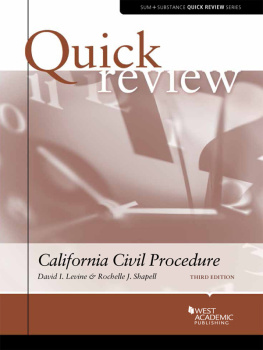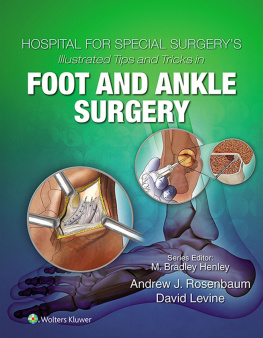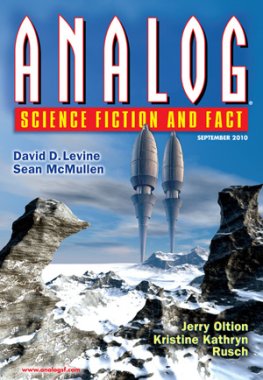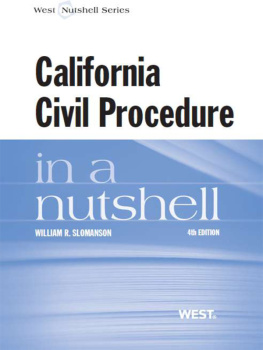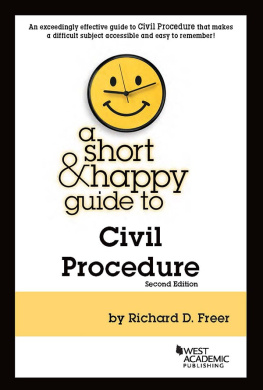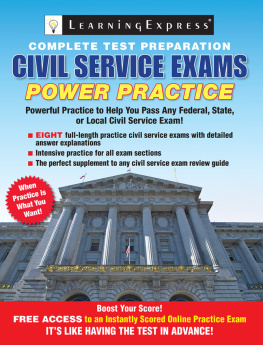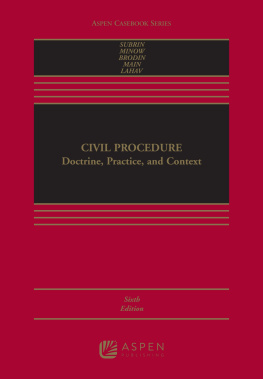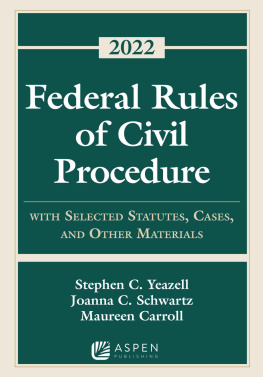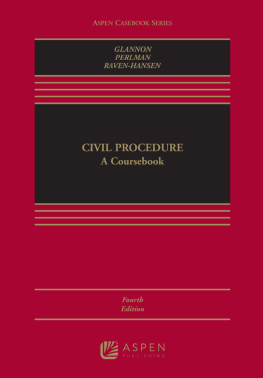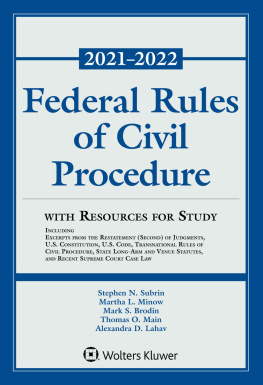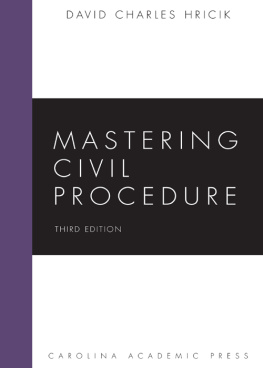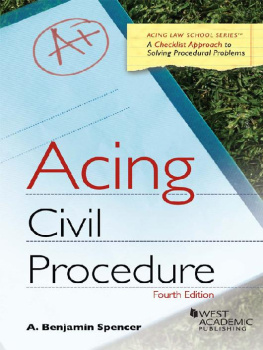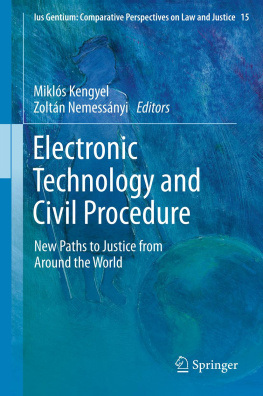David Levine - Quick Review of California Civil Procedure
Here you can read online David Levine - Quick Review of California Civil Procedure full text of the book (entire story) in english for free. Download pdf and epub, get meaning, cover and reviews about this ebook. year: 2015, publisher: West Academic, genre: Politics. Description of the work, (preface) as well as reviews are available. Best literature library LitArk.com created for fans of good reading and offers a wide selection of genres:
Romance novel
Science fiction
Adventure
Detective
Science
History
Home and family
Prose
Art
Politics
Computer
Non-fiction
Religion
Business
Children
Humor
Choose a favorite category and find really read worthwhile books. Enjoy immersion in the world of imagination, feel the emotions of the characters or learn something new for yourself, make an fascinating discovery.
- Book:Quick Review of California Civil Procedure
- Author:
- Publisher:West Academic
- Genre:
- Year:2015
- Rating:3 / 5
- Favourites:Add to favourites
- Your mark:
- 60
- 1
- 2
- 3
- 4
- 5
Quick Review of California Civil Procedure: summary, description and annotation
We offer to read an annotation, description, summary or preface (depends on what the author of the book "Quick Review of California Civil Procedure" wrote himself). If you haven't found the necessary information about the book — write in the comments, we will try to find it.
This book provides a comprehensive analysis of California civil procedure, convenient for class or exam preparation.
Quick Review of California Civil Procedure — read online for free the complete book (whole text) full work
Below is the text of the book, divided by pages. System saving the place of the last page read, allows you to conveniently read the book "Quick Review of California Civil Procedure" online for free, without having to search again every time where you left off. Put a bookmark, and you can go to the page where you finished reading at any time.
Font size:
Interval:
Bookmark:

LAW SCHOOL ADVISORY BOARD
JESSE H. CHOPER
Professor of Law and Dean Emeritus,
University of California, Berkeley
JOSHUA DRESSLER
Distinguished University Professor, Frank R. Strong Chair in Law
Michael E. Moritz College of Law, The Ohio State University
YALE KAMISAR
Professor of Law Emeritus, University of San Diego
Professor of Law Emeritus, University of Michigan
MARY KAY KANE
Professor of Law, Chancellor and Dean Emeritus,
University of California,
Hastings College of the Law
LARRY D. KRAMER
President, William and Flora Hewlett Foundation
JONATHAN R. MACEY
Professor of Law, Yale Law School
ARTHUR R. MILLER
University Professor, New York University
Formerly Bruce Bromley Professor of Law, Harvard University
GRANT S. NELSON
Professor of Law, Pepperdine University
Professor of Law Emeritus, University of California, Los Angeles
A. BENJAMIN SPENCER
Earle K. Shawe Professor of Law,
University of Virginia School of Law
JAMES J. WHITE
Robert A. Sullivan Professor of Law Emeritus,
University of Michigan
Third Edition
David I. Levine
Professor of Law
University of California
Hastings College of the Law
Rochelle J. Shapell
Adjunct Professor of Law
University of California
Hastings College of the Law
QUICK REVIEW SERIES

The publisher is not engaged in rendering legal or other professional advice, and this publication is not a substitute for the advice of an attorney. If you require legal or other expert advice, you should seek the services of a competent attorney or other professional.
Sum & Substance Quick Review Series is a Publication of West Academic Publishing.
West, a Thomson business, 2008
2012 Thomson Reuters
2016 LEG, Inc. d/b/a West Academic
444 Cedar Street, Suite 700
St. Paul, MN 55101
1-877-888-1330
Printed in the United States of America
ISBN: 978-0-314-29022-9
For Our Parents
As students go through law school, they sometimes wonder whether they should know more about the differences in civil practice in state and federal courts. Failing to act on this concern is risky. Students who start their professional careers assuming that civil procedure in Californias state courts fully mirrors the federal system they encountered in their first procedure course are in for a surprise. It is especially perilous to presume that the two systems operate the same now that state civil procedure is eligible for testing on the California Bar Examination.
Readers who find their way to this Quick Review will probably fall into one of four groups. Some law students will have chosen to take an advanced course in California Civil Procedure and are now looking for a study guide. Other students will have neglected or elected not to take a state procedure course, but are nevertheless interested in learning about the differences between the two systems. Graduating students looking toward the California Bar Examination may find this outline a helpful supplemental study aid. New (or not so new) lawyers may also find this Quick Review to be a handy guide if they are about to be cast into the unfamiliar territory of state court. Whichever category describes you best, we hope that this Quick Review will fill your needs.
This Quick Review provides a tour through the most important aspects of California civil procedure. The book focuses on topics usually not covered in the standard first-year course in procedure where California has taken a road not followed in federal practice. It also features topics where California procedural law has solved problems in somewhat different fashion than in federal courts. Throughout the book you will find sections entitled Compare Federal Procedure, which expressly highlight the state/federal differences that are so crucial to this field of study. Finally, each chapter contains many illustrations and sample examination questions, placed in California state courts, so you can test your understanding of the topics. (All characters appearing in illustrations and sample examination questions are fictitious. Any resemblance to real persons, living or dead, is coincidental.)
Nearly all of the state and federal statutes and rules cited in the Quick Review can be found in David I. Levine, Civil Procedure in California: State and Federal. West Academic publishes this paperback of supplemental materials annually. In Chapter 1 of the vi Quick Review, we cite to useful secondary sources for further understanding of, or research in, California Civil Procedure.
We express our sincere thanks to Sarah Barr for her valuable research assistance in the development of this edition of the Quick Review. Her help would not have been possible without the support of our home institution, University of California, Hastings College of the Law. Most of all, we thank William R. Slomanson of Thomas Jefferson School of Law, our co-author on Cases and Materials in California Civil Procedure (West Academic, 5th ed. 2015). Through our long collaboration on that project, he has contributed mightily to our understanding of this complex field.
D.I.L.
R.J.S.
November 2015
Third Edition
Primary authorities constitute the law. See CCP 18951899. All primary authorities have binding force in their respective jurisdictions.
Californias Constitution contains several procedural provisions. For example, the Constitution sets out the structure and hierarchy of the states trial and appellate courts (art. VI), and it secures the right to a jury trial in civil and criminal cases (art. I, 16). In contrast to the U.S. Constitution, the state Constitution explicitly provides an inalienable right to privacy (art. I, 1), which affects such procedural matters as the scope of discovery (see Chapter 4).
The federal Constitution impacts California procedure to the extent its provisions apply to the states. For example, the Due Process Clause of the Fourteenth Amendment is applicable to the exercise of personal jurisdiction in California. (See Chapter 2(II).) However, the Seventh Amendments right to a jury trial in civil cases does not apply to the states. Minneapolis & St. Louis Railroad Co. v. Bombolis, 241 U.S. 211, 36 S.Ct. 595 (1916). (See Chapter 6(II).)
The California Code of Civil Procedure (CCP) is the repository for numerous provisions enacted by the California Legislature that govern state civil procedure. In addition to the CCP, several other California codes contain important procedural statutes, including the Civil, Evidence, and Government Codes.
Font size:
Interval:
Bookmark:
Similar books «Quick Review of California Civil Procedure»
Look at similar books to Quick Review of California Civil Procedure. We have selected literature similar in name and meaning in the hope of providing readers with more options to find new, interesting, not yet read works.
Discussion, reviews of the book Quick Review of California Civil Procedure and just readers' own opinions. Leave your comments, write what you think about the work, its meaning or the main characters. Specify what exactly you liked and what you didn't like, and why you think so.

